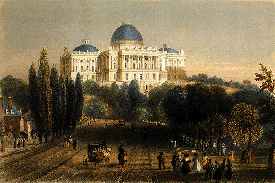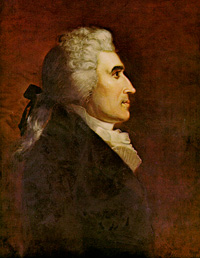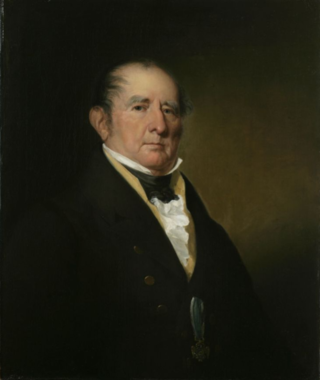
The 18th United States Congress was a meeting of the legislative branch of the United States federal government, consisting of the United States Senate and the United States House of Representatives. It met in Washington, D.C., from March 4, 1823, to March 4, 1825, during the seventh and eighth years of James Monroe's presidency. The apportionment of seats in the House of Representatives was based on the 1820 United States census. Both chambers had a Democratic-Republican majority.

Jonathan Dayton was an American Founding Father and politician from New Jersey. At 26, he was the youngest person to sign the Constitution of the United States. He was elected to the United States House of Representatives in 1791 and later served from 1795 to 1799 as its third Speaker. He left the House in 1799 after being elected to the U.S. Senate, where he served one term. Dayton was arrested in 1807 for alleged treason in connection with Aaron Burr's conspiracy to establish an independent country in the Southwestern United States and parts of Mexico. He was exonerated by a grand jury, but his national political career never recovered.
These are tables of congressional delegations from New York to the United States House of Representatives and the United States Senate.
These are tables of congressional delegations from New Jersey to the United States Senate and United States House of Representatives.
James Jefferson Wilson was a U.S. Senator from New Jersey from 1815 to 1821.

James Schureman was an American merchant and statesman from New Brunswick, New Jersey. He represented New Jersey in the Continental Congress as well as the United States House of Representatives and United States Senate.

Aaron Ogden was an American soldier, lawyer, United States Senator and the fifth governor of New Jersey. Ogden is perhaps best known today as the complainant in Gibbons v. Ogden which destroyed the monopoly power of steamboats on the Hudson River in 1824.

The 1826–27 United States House of Representatives elections were held on various dates in various states between July 3, 1826, and August 30, 1827. Each state set its own date for its elections to the House of Representatives before the first session of the 20th United States Congress convened on December 3, 1827. They occurred during John Quincy Adams's presidency. Elections were held for all 213 seats, representing 24 states.

The 1822–23 United States House of Representatives elections were held on various dates in various states between July 1, 1822, and August 14, 1823. Each state set its own date for its elections to the House of Representatives before the first session of the 18th United States Congress convened on December 1, 1823. They occurred during President James Monroe's second term.

Oliver Hampton Smith was a United States representative and Senator from Indiana.
Beginning from its inception into statehood, New Jersey elected its representatives at-large instead of from individual districts. This continued for most years until 1843, with the exception of the years 1799-1801, and 1813-1815 when they were elected in districts. After 1843, New Jersey returned to district representation. Four at-large representatives were elected in 1789 until 1793 when a 5th representative was added. 6 seats were allocated beginning in 1803, continuing until at-large representation ceased in 1843.
Thomas Henderson was a United States representative from New Jersey. He served as acting governor of New Jersey in 1793.
James Ford was a Jacksonian member of the U.S. House of Representatives from Pennsylvania.

Samuel Moore was a member of the U.S. House of Representatives from Pennsylvania.
Hedge Thompson, a Representative from New Jersey. Thompson was born in Salem, New Jersey on January 28, 1780. He graduated from the medical department of the University of Pennsylvania at Philadelphia in 1802 and practiced his profession in Salem; member of the New Jersey General Assembly in 1805; served in the New Jersey Legislative Council in 1819; appointed associate judge of Salem County, N.J., in 1815 and again in 1824; served as collector for Salem County from 1826 to 1828; elected to the Twentieth Congress and served from March 4, 1827, until his death in Salem, N.J., on July 23, 1828; interment in St. John's Protestant Episcopal Churchyard.
James Fitz Randolph was a United States representative from New Jersey. He was also the father of Theodore Fitz Randolph. Born in Middlesex County, New Jersey, he received a limited schooling.

William Halstead was an American Whig Party politician who represented New Jersey at large in the United States House of Representatives from 1837 to 1839, and again from 1841 to 1843.

The 1824–25 United States Senate Elections were held on various dates in various states. As these U.S. Senate elections were prior to the ratification of the Seventeenth Amendment in 1913, senators were chosen by state legislatures. Senators were elected over a wide range of time throughout 1824 and 1825, and a seat may have been filled months late or remained vacant due to legislative deadlock. In these elections, terms were up for the senators in Class 3.

The 1824 United States presidential election in New Jersey took place between October 26 and December 2, 1824, as part of the 1824 United States presidential election. Voters chose eight representatives, or electors to the Electoral College, who voted for President and Vice President.

Following is a table of United States presidential elections in New Jersey, ordered by year. Since its admission to statehood in 1787, New Jersey has participated in every U.S. presidential election.












